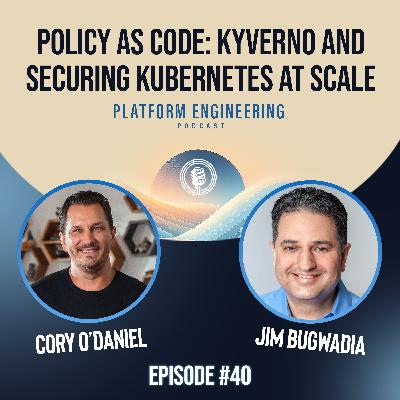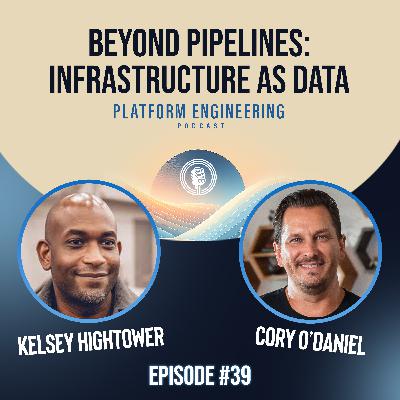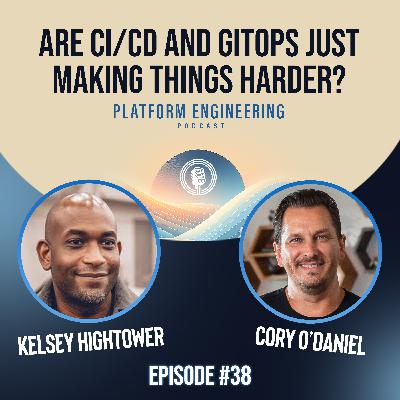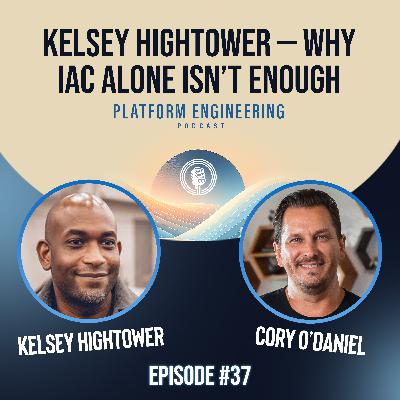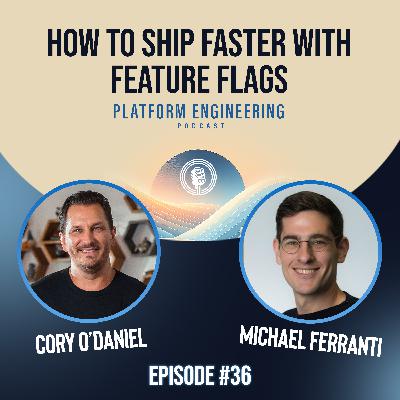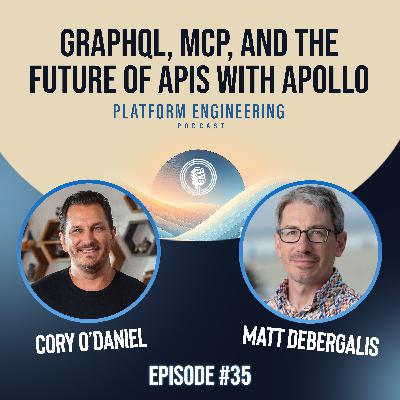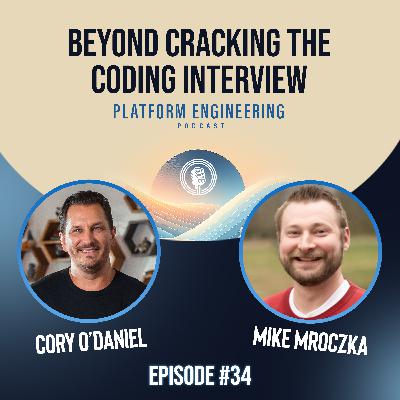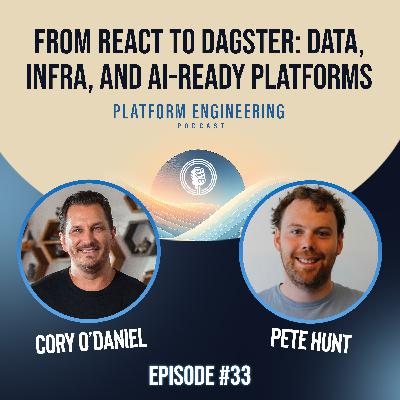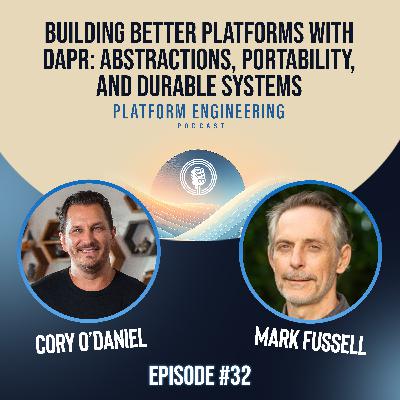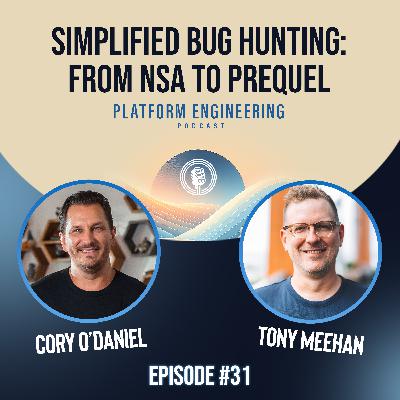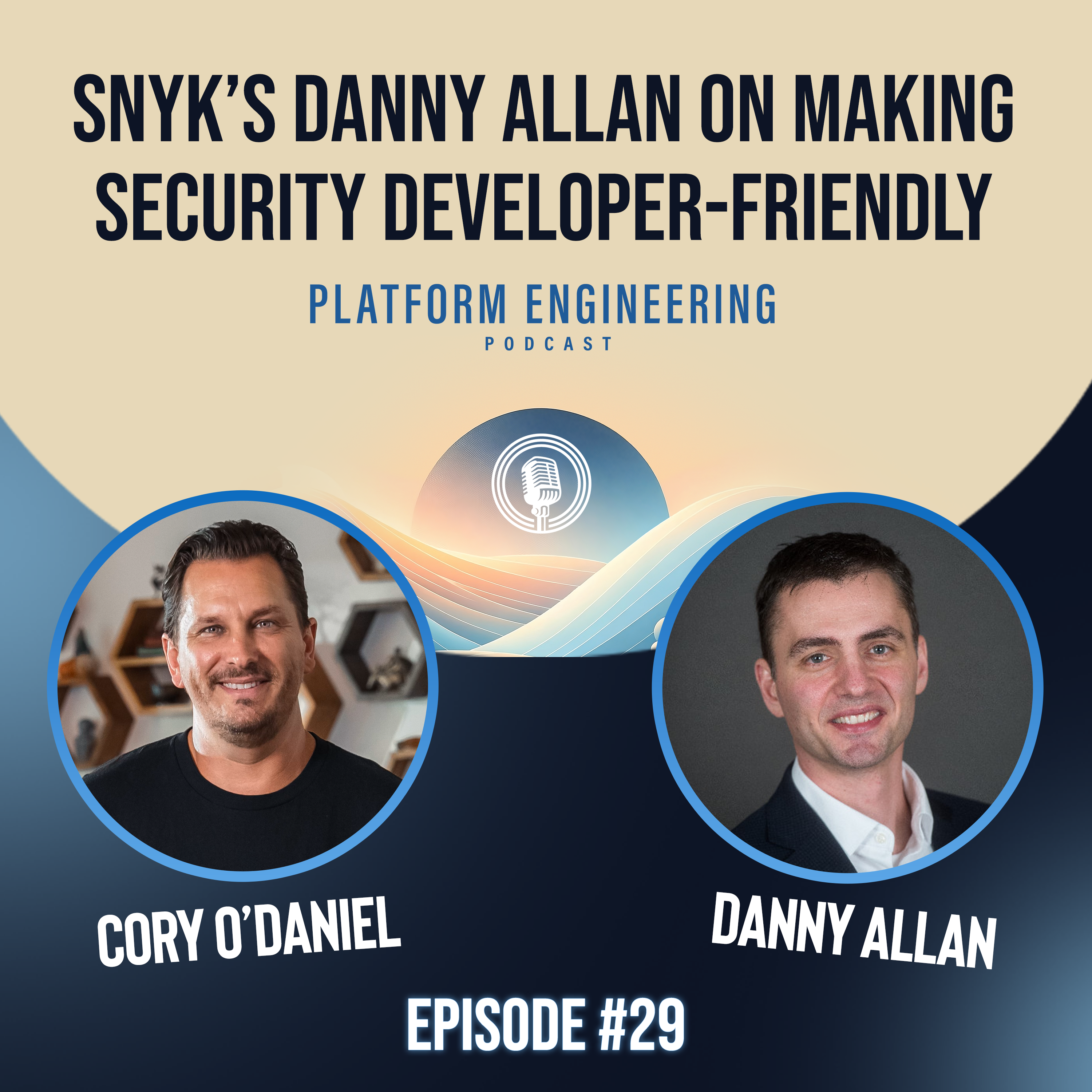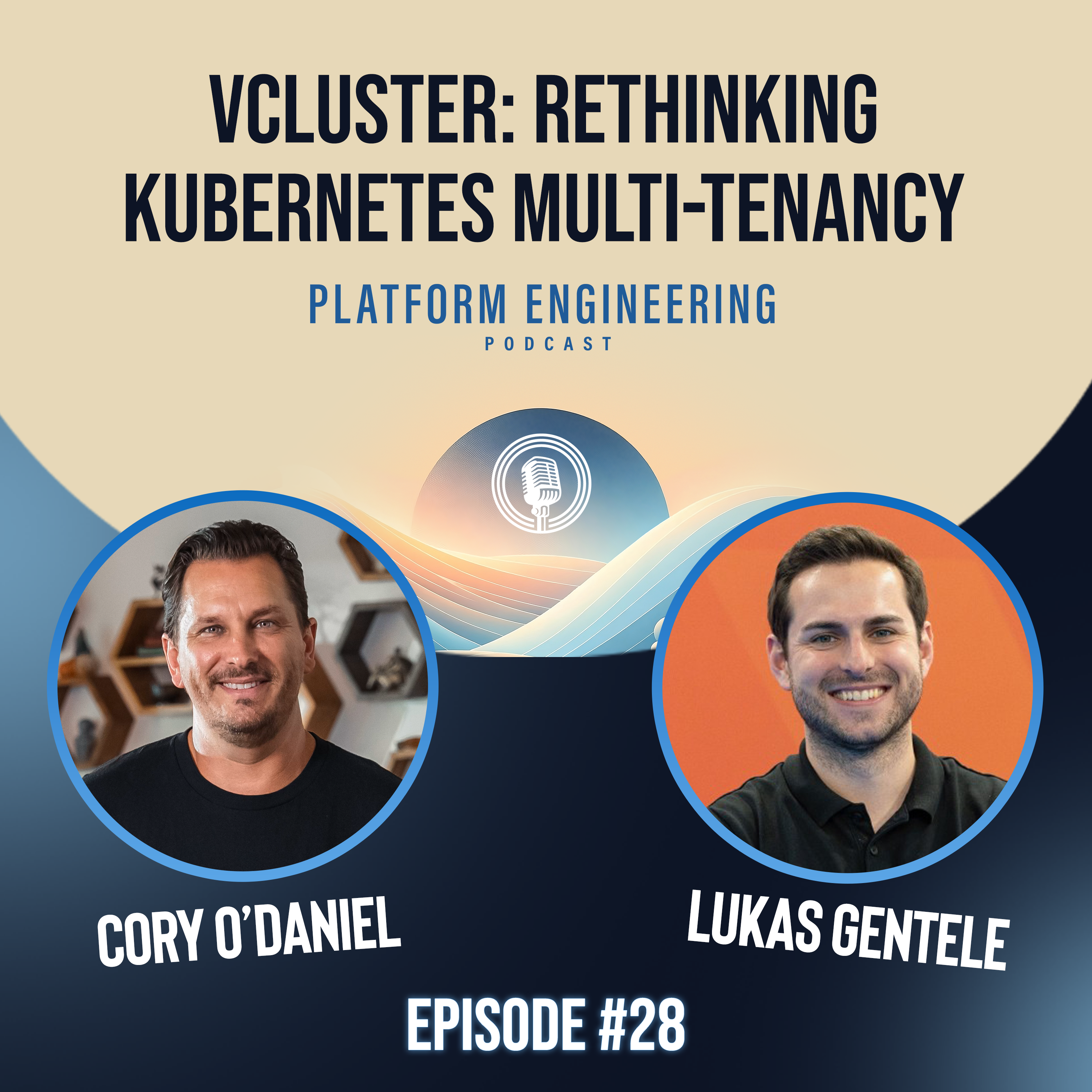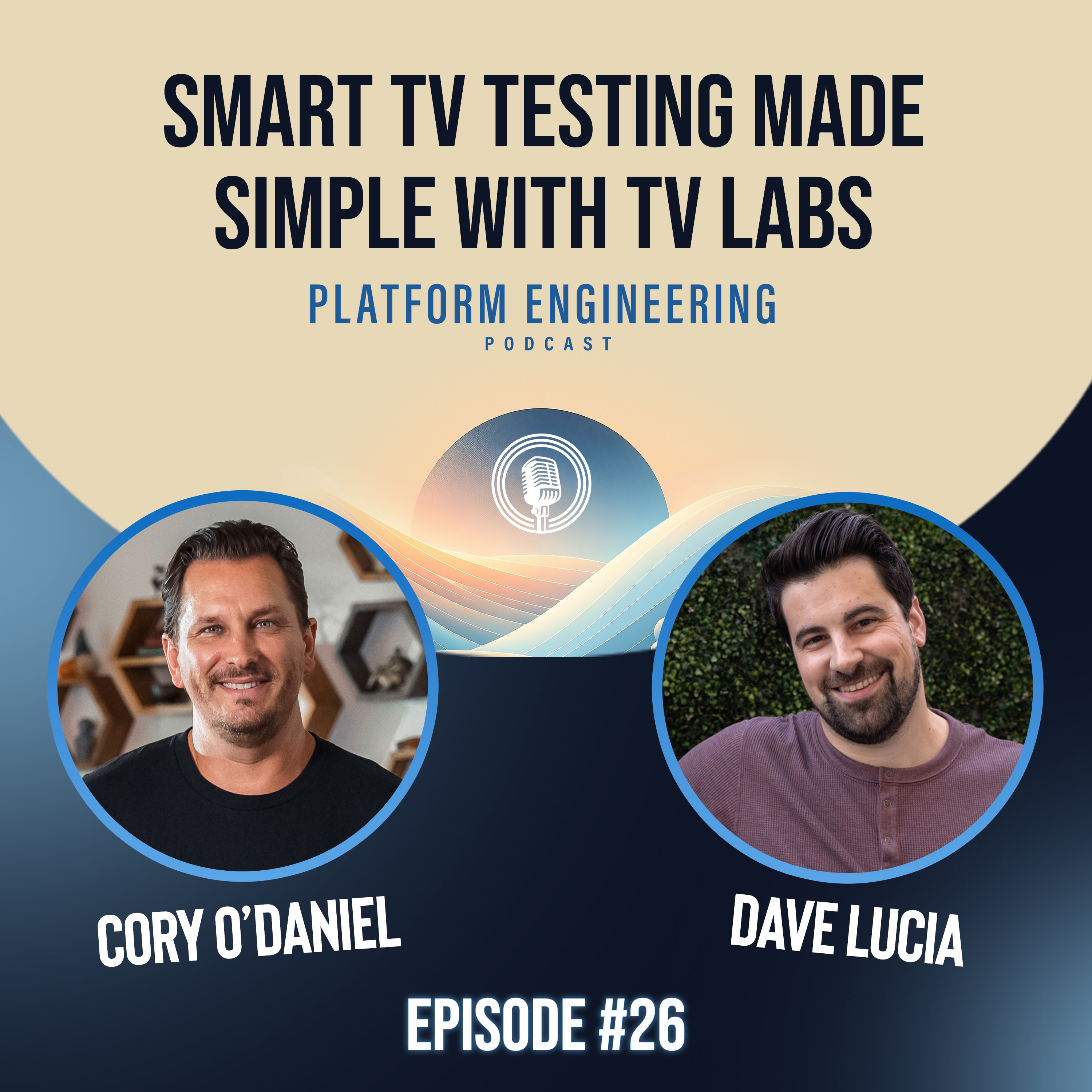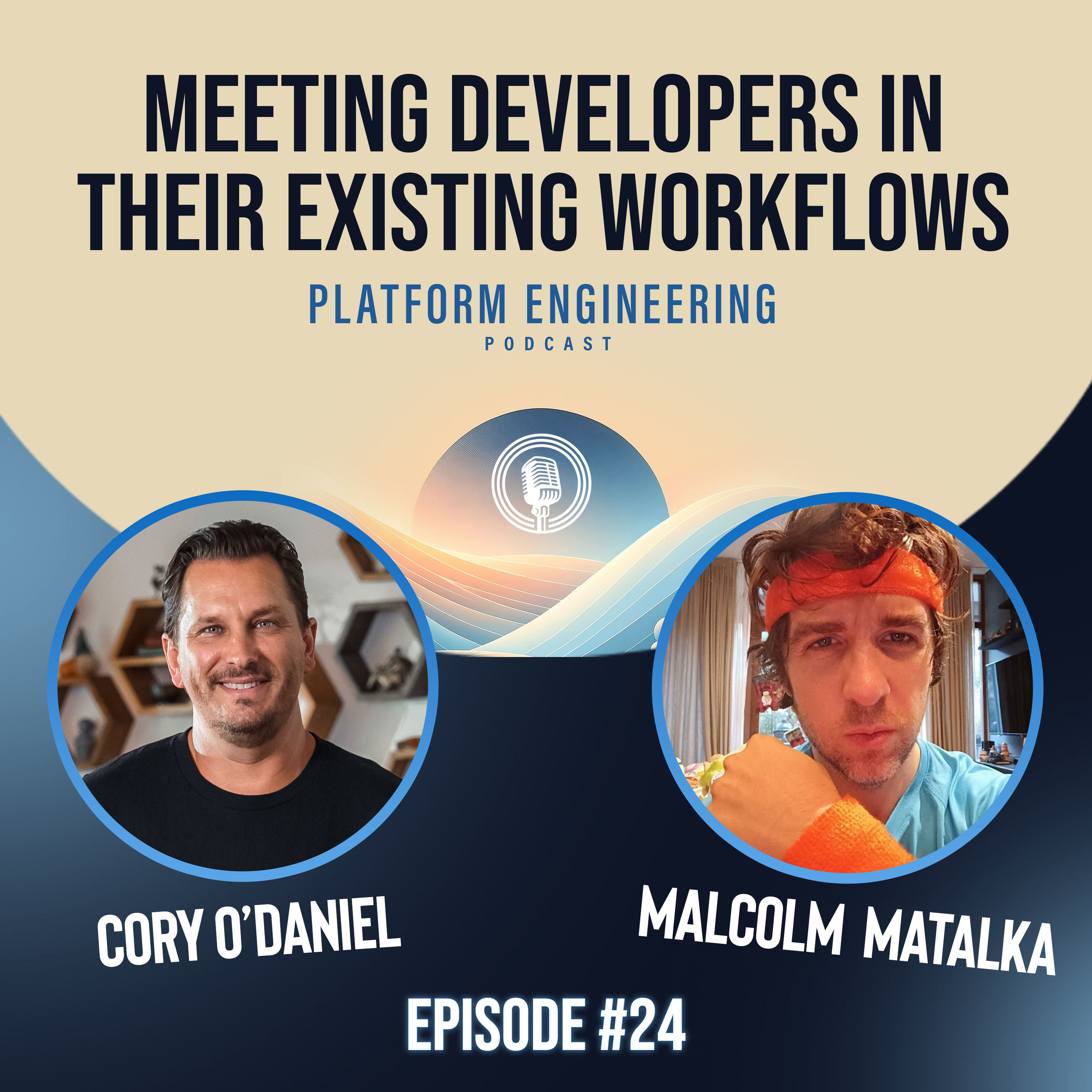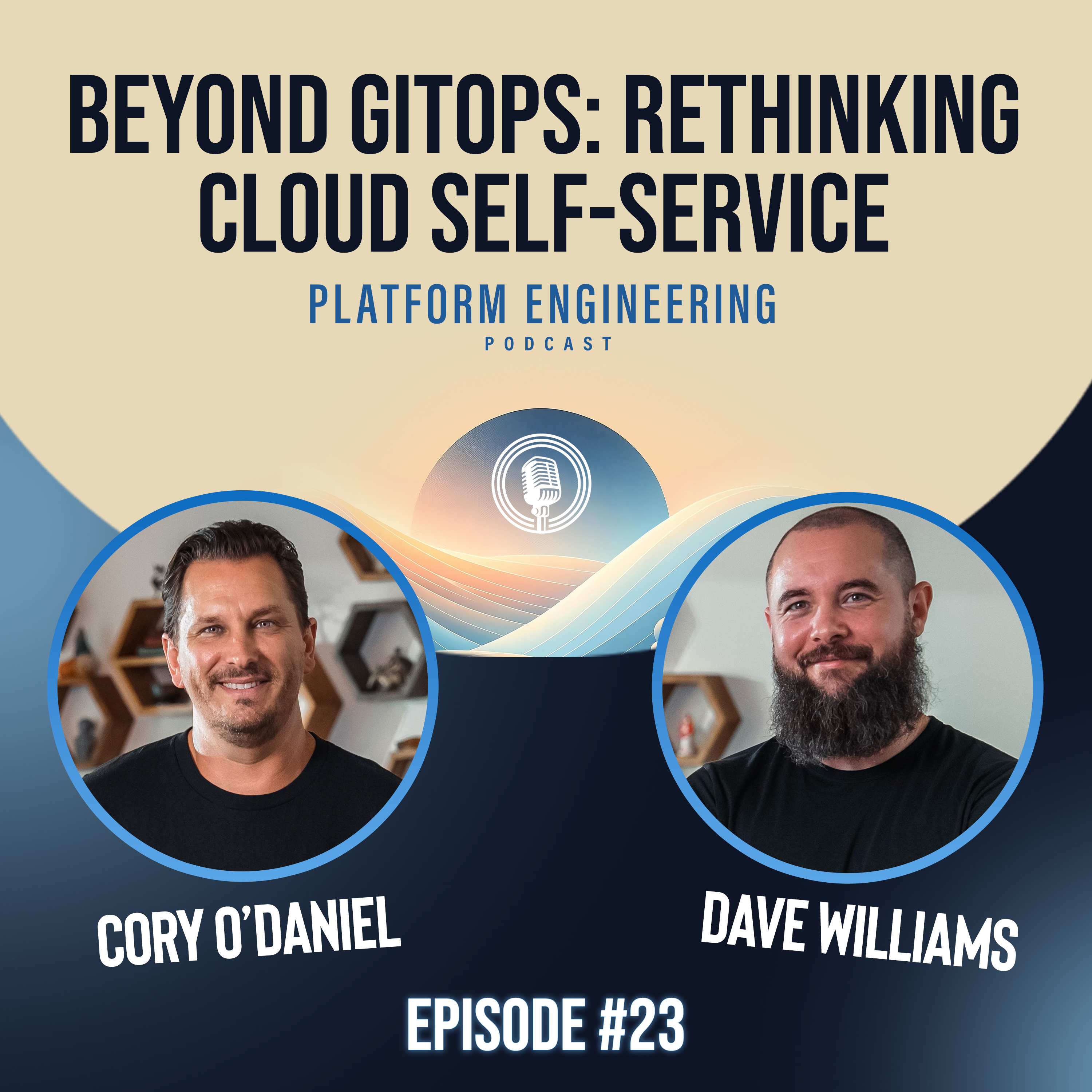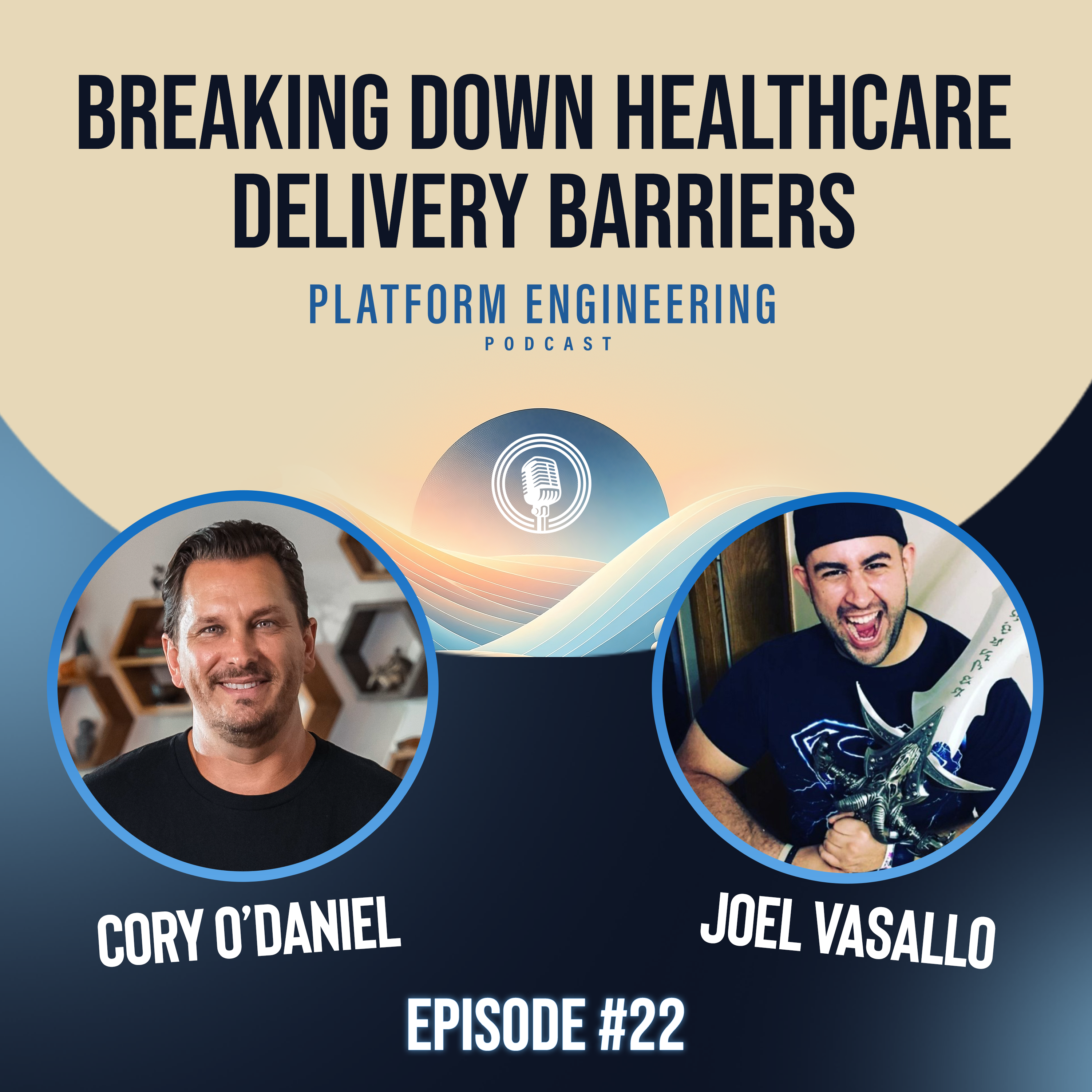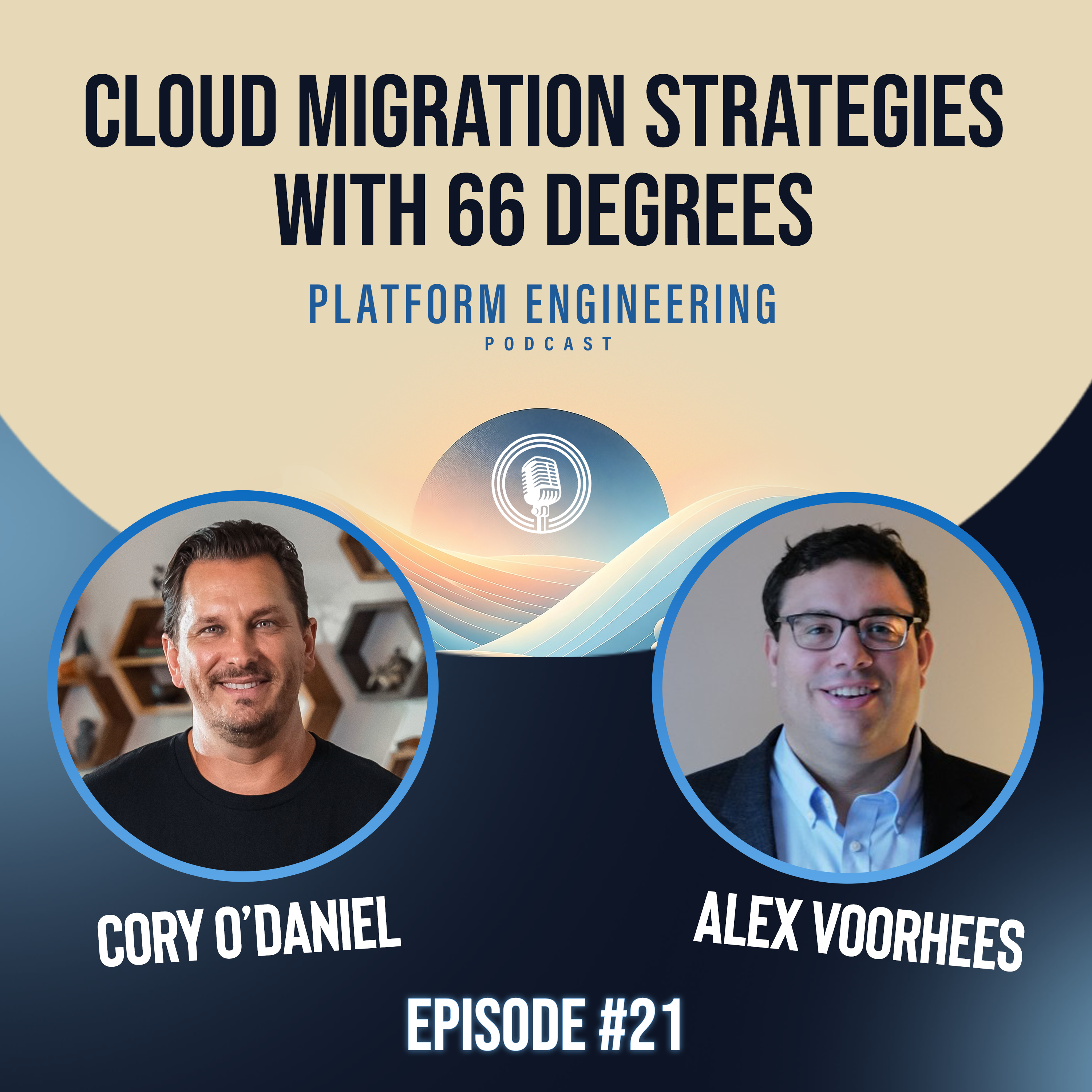Discover Platform Engineering Podcast
Platform Engineering Podcast

Platform Engineering Podcast
Author: Cory O'Daniel, CEO of Massdriver
Subscribed: 20Played: 243Subscribe
Share
© Copyright 2025 | All Rights Reserved | Massdriver, Inc.
Description
The Platform Engineering Podcast is a show about the real work of building and running internal platforms — hosted by Cory O’Daniel, longtime infrastructure and software engineer, and CEO/cofounder of Massdriver.
Each episode features candid conversations with the engineers, leads, and builders shaping platform engineering today. Topics range from org structure and team ownership to infrastructure design, developer experience, and the tradeoffs behind every “it depends.”
Cory brings two decades of experience building platforms — and now spends his time thinking about how teams scale infrastructure without creating bottlenecks or burning out ops. This podcast isn’t about trends. It’s about how platform engineering actually works inside real companies.
Whether you're deep into Terraform/OpenTofu modules, building golden paths, or just trying to keep your platform from becoming a dumpster fire — you’ll probably find something useful here.
Each episode features candid conversations with the engineers, leads, and builders shaping platform engineering today. Topics range from org structure and team ownership to infrastructure design, developer experience, and the tradeoffs behind every “it depends.”
Cory brings two decades of experience building platforms — and now spends his time thinking about how teams scale infrastructure without creating bottlenecks or burning out ops. This podcast isn’t about trends. It’s about how platform engineering actually works inside real companies.
Whether you're deep into Terraform/OpenTofu modules, building golden paths, or just trying to keep your platform from becoming a dumpster fire — you’ll probably find something useful here.
40 Episodes
Reverse
Most Kubernetes security breaches don't come from zero-day exploits - they come from misconfigurations. While your team runs scanners and reviews reports, containers are already running as root, network policies are missing, and compliance violations are piling up across dozens of repositories.Jim Bugwadia, co-founder and CEO of Nirmata and creator of Kyverno, joins Cory to talk about a different approach: policy as code. Instead of asking developers to remember security best practices across every repo, what if your cluster automatically enforced secure defaults and blocked non-compliant deployments before they ever reached production?You'll learn how to start using Kyverno today without breaking your production environment - from running your first audit scan (no installation required) to implementing enforcement mode with exceptions. Jim explains why micro-segmentation matters more than ever, how to automate network policies for every namespace, and why platform teams are using Kyverno for everything from security to cost optimization.Whether you're running one cluster or managing Kubernetes at scale, this conversation offers practical strategies for making security a byproduct of your platform - not an afterthought.Topics covered:Why shift-left security fails and what "shift-down" means for platform teamsHow to implement Kubernetes policy enforcement without grinding deployments to a haltAutomating secure defaults: network policies, resource quotas, and role bindingsThe crawl-walk-run approach to rolling out policies in existing clustersReal-world use cases beyond security: cost optimization and resource managementGuest: Jim Bugwadia, Co-Founder & CEO of Nirmata and creator of KyvernoJim Bugwadia is the Co-founder and CEO of Nirmata, a Kubernetes management platform built for enterprises to simplify and scale cloud-native operations across clouds, data centers, edge, and connected devices. With a mission to democratize cloud-native best practices, Jim brings deep expertise in building large-scale software products and leading high-performing teams. Before founding Nirmata, he led a global consulting team at Cisco, guiding enterprises and service providers on their cloud computing journeys. Earlier in his career, he contributed to innovative products at startups and major companies including Trapeze Networks, Pano Logic, Jetstream, Lucent, and Motorola. A hands-on technologist, Jim continues to code in Go, Java, and JavaScript, reflecting his passion for building in the rapidly evolving world of software.Jim Bugwadia, XNirmataKyvernoLinks to interesting things from this episode:Kyverno Community Repository“Shift-Down Security” PaperOpenReportsPolicy Reporter“The Shai-Hulud npm malware attack: A...
Is your Git repo really the source of truth for infrastructure - or just a suggestion?Guest host Kelsey Hightower sits down with Cory O’Daniel to unpack why many teams hit dead ends with CI/CD for provisioning, where GitOps struggles with drift, and when TicketOps helps or hurts. They explore a different model: infrastructure as data with typed contracts, shared artifacts, and workflows that embed policy, validation, and upgrades from the start. You’ll hear practical ways to reduce cognitive load for developers while giving operations reliable control and better day‑2 levers.You’ll learn:Why pipelines are a poor fit for infra provisioning and what to do insteadHow to reason about drift as a three‑way merge with realityWhen reconciliation helps, and when it breaks production firefightsHow typed contracts and artifacts connect modules and teams without glue scriptsWays to present safer self‑service without requiring everyone to learn TerraformA simple mental model for treating TicketOps as a surface, not the workflowGuest Host: Kelsey HightowerKelsey has worn every hat possible throughout his career in tech and enjoys leadership roles focused on making things happen and shipping software. Prior to his retirement, he was a Distinguished Engineer at Google, where he worked on Google Cloud Platform. He is a strong open source advocate with a focus on building great software as well as great communities around them. He is also an accomplished author and keynote speaker with a knack for demystifying complex topics, doing live demos and enabling others to succeed. When he is not writing code, you can catch him giving technical workshops covering everything from programming to system administration.Guest: Cory O'Daniel, CEO and Co-Founder of Massdriver and Co-Founder of OpenTofuCory has been a software architect and engineer for 20 years, leading up to the founding of MassDriver. He's also a husband and the father of two kids.Cory O'Daniel, XCory O'Daniel, MediumMassdriver, websiteMassdriver, GitHubMassdriver, YoutubeOpen TofuLinks to interesting things from this episode:"Gitopscracy" video
What if your production environment had a live, trustworthy blueprint you could zoom in and out of on demand?Kelsey Hightower guest-hosts a candid conversation with Cory about why CI/CD pipelines and GitOps often break down for cloud infrastructure. They explore a simpler operational model: treat infrastructure as data, lean on clear checkpoints instead of rigid “golden paths,” and make production legible for both developers and ops.You’ll learn:Where CI/CD adds friction for infra and what to do insteadWhy GitOps works for apps but hits limits for databases, networks, and multi-region realitiesHow “living diagrams” help new teammates understand prod on day onePractical guardrails that evolve with your org without locking teams inWays to reduce drift, surprise cloud costs, and Day Two chaosA mindset shift: databases for ops data, not shell-script archaeologyWalk away with concrete patterns to make production understandable, auditable, and easier to change—without more YAML or bigger pipelines.Guest Host: Kelsey HightowerKelsey has worn every hat possible throughout his career in tech and enjoys leadership roles focused on making things happen and shipping software. Prior to his retirement, he was a Distinguished Engineer at Google, where he worked on Google Cloud Platform. He is a strong open source advocate with a focus on building great software as well as great communities around them. He is also an accomplished author and keynote speaker with a knack for demystifying complex topics, doing live demos and enabling others to succeed. When he is not writing code, you can catch him giving technical workshops covering everything from programming to system administration.Guest: Cory O'Daniel, CEO and Co-Founder of Massdriver and Co-Founder of OpenTofuCory has been a software architect and engineer for 20 years, leading up to the founding of MassDriver. He's also a husband and the father of two kids.Cory O'Daniel, XCory O'Daniel, MediumMassdriver, websiteMassdriver, GitHubMassdriver, YoutubeOpen TofuLinks to interesting things from this episode:SigNoz“The $6,459 Terraform Lesson: Why Infrastructure Lifecycle Monitoring Matters” by Liz Fong-Jones "Gitopscracy" video
Ever wonder why strong Terraform modules still lead to long review queues and fragile pipelines? From hand-built scripts and early data center migrations to cloud sprawl and Kubernetes, configuration management has changed a lot - but the core struggle remains: too many decisions, not enough guardrails. Guest host Kelsey Hightower sits down with Cory O’Daniel to unpack where Infrastructure as Code succeeds and where teams get stuck.What you’ll learn:How to avoid “choice overload” in cloud configs by moving decisions upstreamPractical ways to pair IaC with UX, policies, and SLAs to reduce toilWhen click-ops is a symptom, not the problem - and how to replace it safelyPatterns for scaling platform practices beyond a handful of expertsA simple mental model for mapping workflows across serverless, containers, and VMsGuest Host: Kelsey HightowerKelsey has worn every hat possible throughout his career in tech and enjoys leadership roles focused on making things happen and shipping software. Prior to his retirement, he was a Distinguished Engineer at Google, where he worked on Google Cloud Platform. He is a strong open source advocate with a focus on building great software as well as great communities around them. He is also an accomplished author and keynote speaker with a knack for demystifying complex topics, doing live demos and enabling others to succeed. When he is not writing code, you can catch him giving technical workshops covering everything from programming to system administration.Guest: Cory O'Daniel, CEO and Co-Founder of Massdriver and Co-Founder of OpenTofuCory has been a software architect and engineer for 20 years, leading up to the founding of MassDriver. He's also a husband and the father of two kids.Cory O'Daniel, XCory O'Daniel, MediumMassdriver, websiteMassdriver, GitHubMassdriver, YoutubeOpen TofuLinks to interesting things from this episode:"The Phoenix Project: A Novel about IT, DevOps, and Helping Your Business Win" by Gene Kim"15 Years of Duct Tape - Why IaC Adoption Stalled at 30"
Still freezing code before Black Friday and hoping nothing breaks? Feature flags can help you ship smaller, safer changes continuously—without the “big bang” risk or painful rollbacks.Cory O’Daniel talks with Unleash VP of Marketing Michael Ferranti about how modern teams use flags as a core delivery primitive alongside CI/CD and trunk-based development. They dig into kill switches for instant mitigation, progressive rollouts tied to real metrics, and why homegrown “if-statement” systems turn into hidden platforms you didn’t mean to build. They also cover the rising volume of AI‑assisted code and how flags provide the control layer to move faster while protecting reliability.What you’ll learn:How feature flags reduce risk for high-stakes periods like Black Friday by avoiding code freezesWhen to replace staging queues with progressive delivery and experiment-driven rolloutsPractical uses: kill switches, trunk-based development, targeting, and cleanup strategies to manage flag debtBuild vs. buy: why DIY flag systems become costly and how Unleash’s open source and on-prem options fit regulated or air‑gapped needsUsing business, engineering, and customer signals to automate safe ramp-ups and ramp-backsWhy AI increases code throughput, how it affects reliability, and how flags create the safety rails for agentic workflowsGuest: Michael Ferranti, VP of Marketing at UnleashMichael Ferranti has held leadership roles at Teleport, Portworx, ClusterHQ, and Rackspace Technology, with a focus on go-to-market strategy in open-source and enterprise software. At Teleport he focused on shifting from legacy security models to developer-first, identity-driven access. At Portworx, he was building new GTM strategies for Kubernetes-native storage when everyone was still figuring out containers, and he helped scale the company from under $500K in revenue to a $370M acquisition by Pure Storage. His work has centered on supporting engineering leaders in delivering features, scaling infrastructure, and improving security without adding unnecessary blockers. Michael has spoken at industry events like KubeCon and theCUBE, sharing insights on platform org design, category creation, and growing open-source adoption. Unleash, websiteUnleash, GitHubUnleash, LinkedInUnleash, XUnleash, SlackUnleash, YouTubeUnleashCon 2025Links to interesting things from this episode:ReactBitbucketLaunchDarklyServiceNowa...
**UPDATE** - Apollo GraphQL has kindly offered us a few free passes to join them at the GraphQL Summit in San Francisco, October 6-8, 2025. If you are interested in going, the code is: PodcastSummit25What if your API layer could help you ship faster today and make tomorrow’s AI workflows safer and easier to build?Apollo CEO Matt DeBergalis explains how GraphQL became a practical standard for unifying messy backends, why declarative schemas and strong types are the “bedrock” for agentic systems, and where MCP fits when you want agents to call business data safely. You’ll hear real examples of speeding up frontends, tightening observability, and running focused personalization without “fat” APIs.What you’ll learn: A plain-language model for GraphQL and why it decouples frontend needs from backend servicesHow typing, schema docs, and field-level telemetry reduce risk and enable LLM-driven toolingPractical ways to expose queries as MCP tools and start with internal “agentic DevOps”Tactics for experiments and personalization that stay fast and measurable at scaleWhy an end-to-end approach (client and server) matters for reliability and speedGuest: Matt DeBergalis, CEO and Co-Founder of Apollo GraphQLMatt DeBergalis is the Chief Executive Officer and Co-Founder of Apollo GraphQL, focused on bringing the popular GraphQL technology to the enterprise. He previously served as Apollo's CTO, leading product and engineering. Matt's longtime focus has been in open source and platforms: he co-founded Meteor.js, which grew to become one of the most popular open-source projects in the world for developing full-stack web apps with JavaScript, as well as ActBlue, the American political fundraising platform that revolutionized grassroots political giving. He attended the Massachusetts Institute of Technology and resides in the San Francisco Bay Area with his family. In his spare time, Matt enjoys taking to the air and flying his 1966 Beechcraft Baron.Apollo GraphQL, websiteApollo GraphQL, GitHubApollo GraphQL, LinkedInApollo GraphQL, XApollo GraphQL, YouTubeLinks to interesting things from this episode:Free Software FoundationCursorMotley Fool podcastGraphQL Summit
Ever wondered how many “perfect” candidates simply learned the test—or how many great engineers get filtered out by bad interview design? Mike Mroczka, interview coach and ex-Googler, shares what really goes on behind technical hiring and how to navigate it to your advantage.What you’ll learn:How leaked question banks and standardized puzzles can distort hiring signals - and where they still helpPractical ways companies can make interviews fairer and harder to game, both on-site and remoteA balanced take on data structures and algorithms: when they’re useful and when they’re noiseTactics to spot and reduce cheating without turning interviews into surveillanceHow to structure interviews for different seniority levels so you measure the right skillsSalary negotiation playbook: timing, leverage, and common pitfalls that cost candidates real moneyGetting past the application black hole: skipping recruiters, networking that works, and coordinating offersWho this helps:Engineers tired of grinding puzzles who want a smarter prep planHiring managers looking to improve signal and reduce false negativesAnyone preparing to negotiate an offer with confidenceGuest: Mike Mroczka, Primary author of Beyond Cracking the Coding Interview, Ex-GoogleMike Mroczka, a former senior SWE (Google, Salesforce, GE), is now a tech consultant with a decade of experience helping engineers land their dream jobs. He’s a top-rated mentor (interviewing.io, Karat, Pathrise, Skilledinc) and the author of viral technical content on system design and technical interview strategies featured on HackerNews, Business Insider, and Wired.Mike Mroczka, websiteBeyond Cracking the Coding InterviewLinks to interesting things from this episode:Cracking the Coding Interview by Gayle Laakmann McDowell HackerOne Interviewing.io Cluely Google glass Ray-Ban HackerRank CodeSignal
Is Postgres actually a better message queue than Kafka? This provocative question is just one of many insights Pete Hunt shares in this conversation about data orchestration, platform engineering, and the evolution of infrastructure.Pete Hunt, CEO of Dagster Labs and former React co-founder at Facebook, brings his unique perspective from working at tech giants like Instagram and Twitter to discuss how different platform team approaches impact product development. Having witnessed both Facebook's clear delineation between product and infrastructure teams and Twitter's DevOps-style ownership model, Pete offers valuable comparisons of these contrasting philosophies.The conversation explores:How Dagster provides a higher-level abstraction for data teams, making it easier to track and debug data assets rather than just managing workflowsThe challenges of modern data platforms and why many organizations struggle with complex, distributed systems that could be simplifiedA practical approach to migrating from Airflow to Dagster with their "Airlift" toolkit that allows for incremental, low-risk transitionsHow AI development is fueling demand for better data orchestration as companies build applications that rely on properly managed data pipelinesPete also shares his thoughtful approach to balancing technical debt and product development with a "quarter on, quarter off" cadence that allows teams to both ship features and clean up the inevitable corners that get cut under deadline pressure.For platform engineers, data teams, and technical leaders navigating the intersection of infrastructure and AI, this episode provides practical insights on creating abstractions that deliver real operational value without unnecessary complexity.Guest: Pete Hunt, CEO of DagsterPete is the CEO of Dagster Labs, where he first joined as Head of Engineering in early 2022 and transitioned into the CEO role later that same year. Before Dagster, Pete co-founded Smyte, an anti-abuse startup acquired by Twitter, where he continued as a senior staff engineer.Earlier in his career, Pete was one of the first engineers to work on Instagram after its acquisition by Facebook in 2012. There, he led development on Instagram’s web and analytics teams and became a co-founder of the React.js project, helping transform an internal experiment into one of the most widely used front-end frameworks in the world. He was also part of the early community around GraphQL and has remained deeply engaged in open source and developer tooling.Pete brings a pragmatic, hands-on perspective to modern data infrastructure. Having been both a founder and an engineer, he focuses on reducing complexity and fatigue in data teams by building tools that actually work together. At Dagster, he remains close to the code and actively involved in technical decisions, combining leadership with deep technical fluency.Pete Hunt, XDagsterDagster PipesDagster AirliftLinks to interesting things from this episode:React“Postgres: a Better Message Queue than Kafka?”
Cloud lock-in isn't just about where your data lives—it's about how deeply cloud-specific code permeates your applications. Mark Fussell, co-creator of Dapr and CEO of Diagrid, joins Cory O'Daniel to explore how Dapr provides clean abstractions for common distributed system patterns, enabling teams to build portable applications without sacrificing cloud-native capabilities.The conversation covers:How Dapr creates a clean separation between application code and underlying infrastructure services like messaging, state management, and secretsWhy platform teams struggle with tight coupling between applications and infrastructure, and how Dapr solves this problemThe benefits of Dapr's sidecar architecture for local development, testing, and production environmentsHow Dapr automatically handles cross-cutting concerns like security, observability, and resiliency without boilerplate codeIntroduction to Dapr's workflow engine for durable execution and the emerging world of stateful AI agentsWhether you're a platform engineer struggling with cloud lock-in or a developer tired of rewriting code for different infrastructures, this conversation demonstrates how Dapr can simplify your distributed systems while maintaining access to the unique capabilities of each cloud provider.Guest: Mark Fussell, Co-founder of Dapr and CEO of DiagridMark Fussell is the CEO of Diagrid, a cutting-edge company that simplifies building and scaling cloud-native applications. As the co-founder of Dapr (Distributed Application Runtime), Mark has played a pivotal role in shaping the future of modern application development by empowering developers to build resilient, distributed systems with ease. With decades of experience in the software industry, Mark has been a driving force behind innovative solutions that bridge the gap between developers and complex infrastructure.DiagridDaprLinks to interesting things from this episode:"XML Bible" by Elliotte Rusty HaroldOpenTelemetrySPIFFEDataGalaxy case studyCloud Native Computing Foundation
Did you know that software engineers often "learn things the hard way" because they lack a standardized system to share knowledge about reliability issues? While security professionals have CVEs to catalog vulnerabilities, reliability engineers have been left to reinvent the wheel with each new bug or outage.Tony Meehan, co-founder and CTO of Prequel, introduces us to Common Reliability Enumerations (CREs) - an open-source approach that's doing for reliability what CVEs did for security. After spending a decade at the NSA hunting vulnerabilities, Tony recognized that the same community-driven approach could revolutionize how we handle reliability issues.This conversation covers:How CREs help developers detect and mitigate reliability issues before they cause outagesThe open-source tools Preq and CRE that allow teams to leverage community knowledgePractical ways to implement these tools in your development workflow (locally, in CI/CD, and production)How this approach can reduce cloud costs by identifying issues rather than over-provisioningTips for debugging mysterious production issues when no CRE exists yetGuest: Tony Meehan, CTO at PrequelTony is an engineering leader obsessed with bugs. He dedicated a decade to vulnerability and exploit development at the National Security Agency (NSA) before leading Engineering at Endgame and Elastic. In 2023, Tony co-founded Prequel to change the way application failure is detected and resolved. Tony Meehan, Xprequel.devgithub.com/prequel-devPrequel, XLinks to interesting things from this episode:Blog post about the partial outage at EndgameCommon Reliability Enumeration (CRE)PreqXKCD: Standards Episode on security with Danny Allan from SnykBrendan Gregg's blog
What if you could turn a five-year software project into a one-month endeavor? Gene Kim, co-founder of IT Revolution and author of The Phoenix Project, reveals how AI-powered Vibe Coding is transforming the way developers work.Kim shares insights from his upcoming book about how developers are achieving unprecedented productivity, including how his co-author produces 12,000 lines of production-ready code daily using AI assistance. But it's not just about speed - learn how this approach enables developers to tackle previously impossible projects and explore larger design spaces.From DevOps evolution to practical AI implementation, Kim discusses:What Vibe Coding really means and how it differs from traditional developmentReal examples of AI accelerating development without sacrificing qualityCommon pitfalls to avoid when implementing AI in your development workflowHow AI is making developers more ambitious rather than replacing themThe critical role of testing and feedback loops in successful AI implementationWhether you're a seasoned developer or a tech leader wondering about AI's place in your development workflow, this conversation provides practical insights into the future of software development.Guest: Gene Kim, Author, Researcher, Vibe Coder, DevOps Enthusiast, Founder of IT RevolutionGene Kim has been studying high-performing technology organizations since 1999. He was the founder and CTO of Tripwire, Inc., an enterprise security software company, where he served for 13 years. His books have sold over 1 million copies—he is the WSJ bestselling author of Wiring the Winning Organization, The Unicorn Project, and co-author of The Phoenix Project, The DevOps Handbook, and the Shingo Publication Award-winning Accelerate. Since 2014, he has been the organizer of DevOps Enterprise Summit (now Enterprise Technology Leadership Summit), studying the technology transformations of large, complex organizations.Gene Kim, XIT RevolutionThe Phoenix ProjectThe Unicorn ProjectVibe CodingLinks to interesting things from this episode:"DevOps is Bullshit"Accelerate“Decoding the DNA of the Toyota Production System”Wiring the Winning Organization“Organizational Learning And Competitiveness: Revisiting The “Allspaw/Hammond 10 Deploys Per Day At Flickr”...
Security often feels like a roadblock to developers, but what if it could be seamlessly integrated into the development process? As software delivery becomes increasingly automated and self-service, the traditional approach to security needs a major overhaul.Danny Allan, CTO at Snyk, shares practical insights on transforming security from a bottleneck into an enabler of developer productivity. Drawing from his extensive experience at IBM, VMware, and Veeam, Allan discusses how security teams can shift left effectively without creating friction.Key topics covered:Building successful security champions programs that cultivate curiosity rather than relying solely on senior developersPractical approaches to embedding security controls into development pipelines, from IDE integration to PR checksStrategies for measuring security team success beyond just vulnerability countsThe role of pre-hardened containers and infrastructure-as-code scanning in platform securityHow AI is transforming both code generation and security tooling, including Snyk's approach to vulnerability detectionGuest: Danny Allan , Chief Technology Officer at SnykAs CTO, Danny leads end-to-end ownership of Snyk’s current core offerings and roadmap, as well as the company’s near-term platform vision. Before joining Snyk, he was CTO at Veeam and Desktone (acquired by VMWare) and Director of Security Research at IBM. In his free time, he loves scuba diving, cycling, and hockey (like a true Canadian!)Snyk, website Snyk, X Snyk, YouTubeSnyk, GithubSnyk, DiscordThe Secure Developer Podcast by SnykLinks to interesting things from this episode:DistroListChainguardVerizon Data Breach Investigation ReportHack This SiteModel Context Protocol
Are your platform teams constantly saying "no" to requests for new Kubernetes clusters? The traditional approach to Kubernetes multi-tenancy forces organizations to choose between cluster sprawl or restrictive namespaces - neither of which fully meets the needs of modern development teams.Lukas Gentele, CEO and co-founder of Loft Labs, shares how vCluster is transforming the way organizations handle multi-tenancy in Kubernetes. By running virtual Kubernetes control planes inside namespaces, vCluster enables teams to experiment with different versions, operators, and configurations while maintaining efficient resource usage.Key topics covered:How vCluster solves the limitations of namespace-based multi-tenancyRunning multiple Kubernetes versions in the same cluster for testing and gradual upgradesManaging bare metal GPU resources efficiently for AI/ML workloadsBalancing standardization with developer autonomy in platform engineeringUsing virtual clusters for cost-effective testing across multiple Kubernetes versionsWhether you're a platform engineer looking to say "yes" more often or a development team seeking greater autonomy within Kubernetes, this discussion offers practical insights into modern multi-tenancy approaches.Guest: Lukas Gentele, CEO & Co-Founder at LoftLabsLukas Gentele is the CEO and Co-founder of Loft Labs, which delivers Kubernetes-native tools, functionality and frameworks purpose-built for platform engineers to manage, activate and optimize their platform stack. Gentele is a dynamic leader with wide-ranging expertise in enterprise architecture, distributed systems, and developer productivity solutions. Prior to Loft, Gentele served as the co-founder and CEO at covexo GmbH and Webmans. Gentele often speaks at conferences such as KubeCon, writes articles for leading industry journals, and likes to share his experiences at meetups. Gentele holds a Bachelor of Science in Computer Science and Information Systems, and a Master of Science in Computer Science & Management of Enterprise Information Systems, both from the University of Mannheim.Lukas Gentele, LinkedInLoft Labs vCluster Slack channelLinks to interesting things from this episode:"Kubernetes the Hard Way" by Kelsey Hightower DevSpace “Inception”
When organizations grow beyond using third-party platforms, they face a critical challenge: how to build internal platforms that enable teams to work efficiently while maintaining security and compliance. Abby Bangser, founding principal engineer at Syntasso, shares insights on creating real-world platforms that strike the right balance between standardization and flexibility.Key InsightsThe shift from external platforms to internal ones often comes from specific business needs, like compliance requirementsSuccessful platform engineering requires finding the right balance between prescriptive standards and flexible customizationPlatforms should offer multiple levels of abstraction - from simplified "paved paths" to advanced customization optionsPlatform teams should watch how users interact with their services to identify emerging patterns and needsGuest: Abby Bangser, Founding Principal Engineer at Syntasso.A hands-on software delivery professional with a passion for using quality as the foundation for quick value-focused delivery. Abby truly embodies the benefits of being a specialising generalist with experience and interests across traditionally Business Analyst, Quality Analyst, Developer, DevOps, Platform Engineering, SRE, and Infrastructure Engineering job titles and effectively leveraging those skills to encourage a well-rounded approach to quality software delivery.The next step for software professionals is the ability to drive thoughtful creation and evaluation of data from the operation of live services. With this in mind, Abby is currently excited to be working in an environment where engineers build and run their own software and understand the value of not only monitoring and logging, but striving for an observable system. It is now her goal to use these tools to create even more collaboration across skills like user research, quality, operations, infrastructure and software development to identify unknown issues that our users face in innovative ways.Abby Bangser, Bluesky Syntasso CNCF Links to interesting things from this episode:ThoughtWorks Massdriver Kratix OpenTofu “Let a 1,000 flowers bloom. Then rip 999 of them out by the roots.” Charity Majors
Testing smart TV applications presents unique challenges that traditional web testing approaches can't solve. Dave Lucia, CTO and co-founder of TV Labs, shares how his team built a platform that virtualizes televisions and set-top boxes to help media companies test their smart TV apps on physical devices.Learn about TV Labs' innovative architecture and how they handle everything from camera-based testing systems to their custom Lua-based DSL for faster test execution. A key highlight is how choosing Elixir as their primary technology has enabled TV Labs to build a robust orchestration system. The language's built-in capabilities for fault tolerance, process isolation, and distributed computing make it particularly well-suited for managing concurrent connections and real-time state across multiple devices.The discussion also explores practical insights about system architecture, including how TV Labs leverages Phoenix presence for real-time device state tracking and achieves microsecond-level performance for message broadcasting.Guest: Dave Lucia, CTO & Co-Founder at TV LabsDave is a technology leader with deep experience designing and scaling systems across industries including media, sports betting, finance, and developer tooling. He is a prominent member of the BEAM community, regularly speaking at conferences such as Code BEAM SF, ElixirConf, The Big Elixir, and RabbitMQ Summit.Dave Lucia, WebsiteDave Lucia, XDave Lucia. BlueskyTV LabsTV Labs, LinkedInLinks to interesting things from this episode:Appium“The Road to 2 Million Websocket Connections in Phoenix”“From $erverless to Elixir”eBPF
Why do 70% of organizations still struggle to adopt infrastructure as code? Sören Martius, CPO and co-founder of Terramate, joins Cory O'Daniel to tackle the challenges of modern infrastructure management and the delicate balance between vendor trust and lock-in.The conversation explores practical solutions for common infrastructure challenges, from managing monolithic state files to orchestrating complex deployments. Martius shares insights on: When to maintain a monolithic state file versus breaking it into smaller unitsHow infrastructure needs evolve as engineering teams grow beyond 100 peopleWhy anti-lock-in features build trust with operations teamsThe role of AI in detecting and remediating infrastructure misconfigurationsFor teams wrestling with infrastructure complexity or evaluating new tools, this discussion offers practical perspectives on building scalable, maintainable infrastructure while avoiding common pitfalls around vendor lock-in and team adoption.Guest: Sören Martius, Founder at TerramateSören is an entrepreneur and technologist who loves building and delivering digital products and managing and scaling engineering teams for various kinds of businesses. His interests in technologies lie with DLT’s, Distributed Networks, Machine Learning, Microservices, Serverless Compute, Docker (and Kubernetes), AWS, Spark, Scala, Go, Elixir & OTP, Python, Rust, and Typescript among many others. Sören likes simplicity, pragmatism and common sense while bridging business, product and technology.Sören Martius, XTerramate, websiteTerramate, GitHubLinks to interesting things from this episode:TerragruntWizStakpakReclaim AIFyxerCursorWindsurf
Building infrastructure tooling doesn't require massive VC funding or a huge team - just ask Malcolm Matalka, co-founder of bootstrapped Terrateam. Malcolm shares his journey from real estate websites to investment banking to biotech, before landing in infrastructure automation.Learn how Terrateam takes a unique "libraries over frameworks" approach to development, prioritizing simplicity and control by carefully selecting dependencies and building critical components in-house. Malcolm explains how this philosophy leads to more maintainable code and better security outcomes.As an early participant in the OpenTofu fork, Malcolm provides insights into the community response and adoption challenges. He discusses how Terrateam helps teams streamline their infrastructure workflows by integrating directly with existing tools and processes rather than forcing new ones.For platform engineers looking to simplify their infrastructure management, Malcolm describes the ideal Terrateam user as someone who wants infrastructure changes to flow naturally through their existing development process without added complexity.Guest: Malcolm Matalka, Software Engineer, Co-Founder of TerrateamAs a co-founder at Terrateam, Malcolm enables teams to deliver infrastructure faster with their tools and services. They leverage Terraform and OpenTofu to automate, manage, and scale cloud infrastructure for developers and organizations.With over 20 years of experience in software engineering, he has a strong background in cloud computing, distributed systems, and infrastructure.Malcolm is also passionate about aerospace and bioinformatics, which led him to found Cosmo Labs AB and work as a software consultant at Abiogenesis Computer Systems Lab. At Cosmo Labs AB, they provided software solutions for satellite communication, orbital mechanics, and data analysis. At Abiogenesis Computer Systems Lab, they tackled bioinformatics challenges such as genome sequencing, protein structure prediction, and drug discovery. Prior to that, he worked for Spotify managing storage solutions at scale.Malcolm Matalka - RedditTerrateamTerrateam - LinkedInLinks to interesting things from this episode:ErlangRiakMnesiaOCamlPuppetTokio
Is GitOps holding your team back? In this thought-provoking conversation with Massdriver co-founder Dave Williams, we challenge conventional wisdom around cloud infrastructure management and explore why traditional approaches to compliance and self-service may be creating more problems than they solve.Discover how leading organizations are moving beyond ceremonial approval processes to create truly automated, self-service platforms that enhance developer productivity while maintaining security and control. Learn why treating infrastructure as code differently from application code could be the key to unlocking engineering velocity.Key topics covered:Why compliance doesn't require manual GitOps workflowsCreating meaningful abstractions that codify operations expertiseThe shift from reactive to proactive infrastructure governanceHow platform teams can become strategic enablers rather than bottlenecksWhether you're a platform engineer, engineering leader, or developer frustrated with current infrastructure processes, this episode offers practical insights for evolving your approach to cloud operations.Guest: Dave Williams, DevOps PropagandistMassdriverLinks to interesting things from this episode:Open TofuHerokuTerratest“Elephant in the cloud: Bridging the cloud infrastructure talent gap with software”
Feeling overwhelmed by the number of apps you need to manage while building developer trust, managing costs, and trying to create an extensible platform that teams actually want to use?Joel Vasallo shares practical insights from scaling TAG's platform engineering initiatives across multiple healthcare organizations. Learn how his team transformed deployment times from weeks to minutes while maintaining security and compliance. Joel breaks down the journey from initial Kubernetes adoption to managing 70+ applications. Listeners will gain actionable strategies for:Starting small with platform initiatives and building organic buy-inBalancing standardization with team autonomyManaging cloud costs across multiple organizationsBuilding trust through visibility and auditabilityWhether you're in healthcare or any regulated industry, this conversation provides a practical roadmap for evolving your platform engineering practice.Guest: Joel Vasallo, Senior Director of Platform Engineering at TAGJoel is the Senior Director of Platform Engineering at TAG - The Aspen Group where he leads teams focused on DevOps, SRE, and Delivery Engineering. Together, these teams aim to build and architect highly available cloud environments, develop infrastructure and development tools, and empower developers through fully automated deployment pipelines. In his spare time, he runs monthly meetups in Chicago through the Google Developers program. When he isn’t working, he loves exploring Sweet Home Chicago!Joel Vasallo - XJoel Vasallo - MediumThe Aspen Group (TAG)Links to interesting things from this episode:ArgoIstioSoloPrometheusKarpenter“From $erverless to Elixir”DuckbillCorey QuinnMalört
Navigating cloud migrations and building modern platforms is challenging in the best of circumstances. Alex Voorhees, VP of Cloud Engineering at 66 Degrees, shares valuable lessons from helping organizations as they take on these challenges.Don’t miss his insights on:How to tackle the human and organizational challenges that come with cloud transformationPractical strategies for upskilling teams transitioning from traditional ops to cloud operationsKey considerations when implementing platform engineering solutions across different organizational maturity levelsIntegrating AI capabilities into cloud architectureCommon pitfalls to avoid when moving legacy applications to the cloudApproaches for balancing innovation with practical business needs during cloud migrationWhether you're leading a cloud migration, building a platform team, or interested in the future of cloud operations, this episode offers concrete takeaways for navigating the technical and organizational challenges of modern infrastructure.Guest: Alex Voorhees, VP of Cloud Engineering at 66 DegreesAlex Voorhees is the Vice President of Cloud Engineering at 66degrees. Prior to joining 66degrees, he was the Vice President of Customer Engineering at Cloudbakers.Alex Voorhees - X66 Degrees - Website66 Degrees - XLinks to interesting things from this episode:BackstageSpaceliftJenkinsAnthropicInterview with Amey Patil from GoogleLattice


